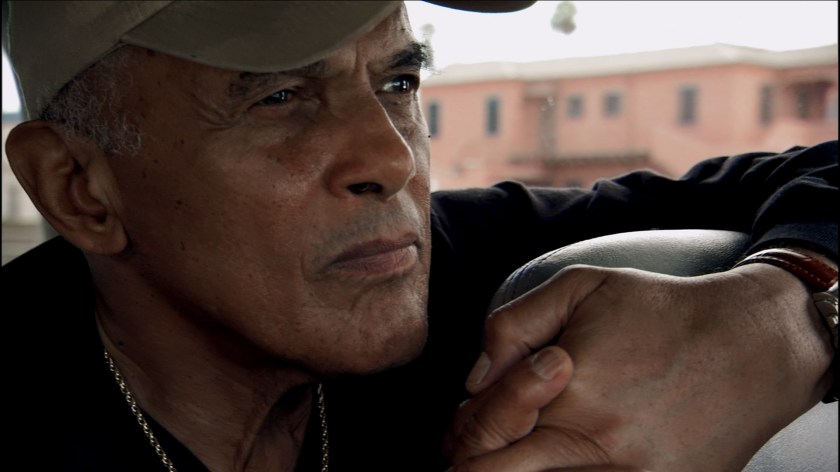
The American born singer Harold George Belafonte, Jr is best known for popularising Caribbean music in the 1950s with songs such as the distinctive ‘The Banana Boat Song’. An all-round entertainer Harry Belafonte acted, sung and danced on stage, film and theatre for both adult and family audiences. He was the first ever celebrity guest on The Muppet Show. His involvement in films such as the all-black musical Carmen Jones (Otto Preminger, 1954) and Island in the Sun (Robert Rossen, 1957), considered controversial at the time due to its implied inter-racial relationship, suggest the degree in which Belafonte was aware of race issues within the United States of America. However for many, the full extent of Belafonte’s political activism and involvement in the civil rights movement may not be known, which is why Susanne Rostock’s documentary Sing Your Song is such a fascinating film.
Sing Your Song is relativity straightforward in the way it presents its material. Belafonte narrates the story of his life over archival footage and photographs, and there are extensive talking head interviews. The film is very much his story and he is the one giving weight to particular incidents in his life and choosing what aspects are of significance. With a less dynamic subject, this style of documentary filmmaking could have felt pedestrian, but Belafonte is a captivating and energetic narrator who the audience feels safe with. Moments of modesty feel genuine and moments of pride feel justified. Rostock has captured the blend of politics and music in Belafonte’s life by continually entwining both elements through the film stylistically and in terms of its narrative. The politics of showbiz are directly explored while juxtapositions between his career as an entertainer and his activism are continually made through editing and sound bridges.
One of the most interesting ways that Sing Your Song reflects the personality of its subject is the coy way it presents many of Belafonte’s achievements. When describing incidents such as swimming in a segregated pool or linking arms on television with a woman he is singing a duet with, Belafonte and the film act as if the results of such acts weren’t obvious and the statements they made were almost accidental. It’s a deliberate downplaying of actions that should have no meaning, but in the context of immense bigotry clearly do. In this way Belafonte and Rostock reclaim ordinary actions as innocent moments, while the racist reaction to such actions is exposed as being outlandish and ridiculous. Sing Your Song therefore very effectively articulates Belafonte’s furious yet no-nonsense stance against discrimination and his refusal to accept bigotry in any form or context.
One sad element of Sing Your Song is the realisation that no public figure or celebrity in a contemporary context could hope to have the same impact as Belafonte did. Cynicism towards celebrity campaigners, which is admittedly frequently deserved, has created a culture where anybody in the public eye who is seen to be too overtly promoting a cause is treated with suspicion and ridicule. What is remarkable about Belafonte is how early in his career he realised that he could use his celebrity and access to other celebrities to raise awareness and generate change, to the extent that he effectively brokered meetings between the Kennedy Administration and leaders of the civil rights movement, including Martin Luther King, Jr. Furthermore, Belafonte has never stopped his campaigning and even looks beyond the boarders of America to see what other parts of the world may require his help. And while the obvious pride Belafonte has for what he has done may turn off some, it is difficult to argue that he doesn’t deserve that pride, nor could he be accused of pretending that he could have done what he did without first becoming successful as entertainer.
Like its subject, Sing Your Song is a passionate film bursting with energy, music and often fury. It’s designed to engage and entertain, but at the same time raise awareness about how injustice and discrimination takes different forms around the world. Belafonte speaks of how he wonders if he has done enough and for a moment this extraordinary moment of self-doubt could seem a little contrived. But that possibly says more about the viewer who doesn’t believe that modesty is ever genuine and who is looking for any excuse to denigrate somebody who is visibly raising awareness while they do nothing. So regardless of how much Sing Your Song reveals Belafonte the person or Belafonte the media savvy social campaigner, what remains is a man who put his career, reputation and life on the line to do more than simply entertain. The resulting film is a fascinating retelling of modern American history filled with music and grounded by a man of immense inspiration and integrity.
